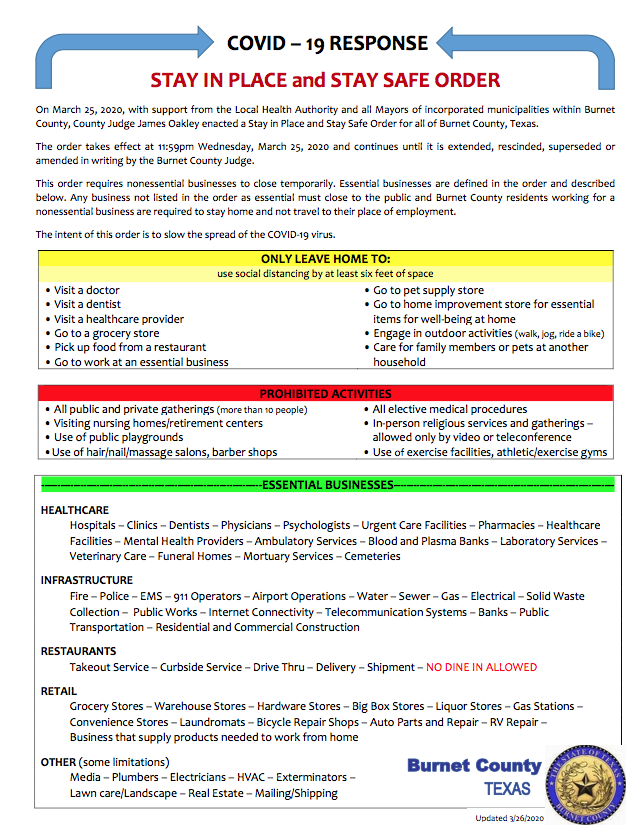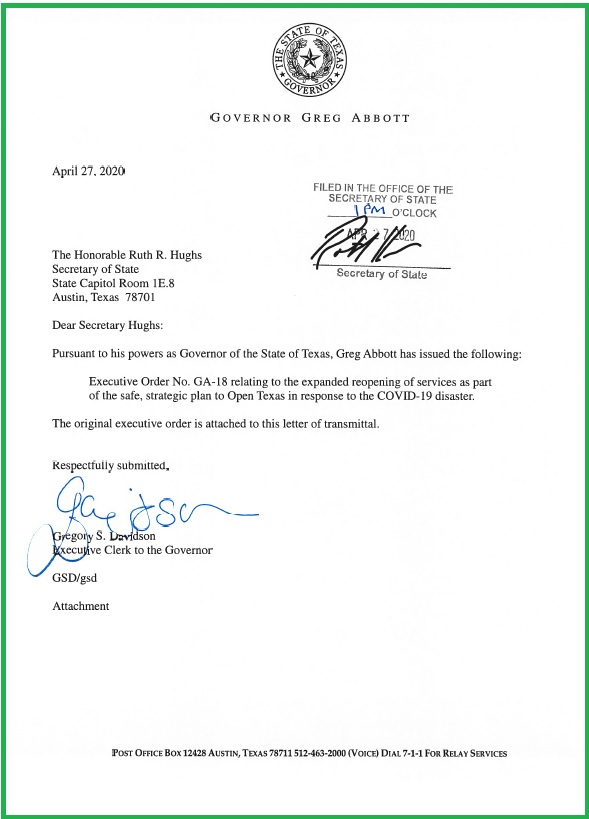Burnet County issues “Stay in Place” order over COVID-19

Burnet County officials created a listing graphic of what the 'Stay in Place and Stay Safe' order means for residents' day-to-day activities.
By Connie Swinney and Lew K. Cohn
The Highlander
Burnet County officials, in cooperation with municipalities and the Burnet County Health Authority, opted March 25 to order “Stay in Place and Stay Safe” guidelines in response to growing concerns about minimizing the number of potential infections of the coronavirus, also known as COVID-19.
“After much collaboration, Burnet County will join other counties and communities across Texas and the nation to ensure responsible activity during this pandemic,” according to a statement by Burnet County Judge James Oakley. “As advised by the Burnet County Local Health Authority and supported by all the mayors of incorporated municipalities within Burnet County, I am enacting a “Stay in Place and Stay Safe” order to be effective at 11:59 p.m. tonight (Wednesday, March 25, 2020).
“This measure is being taken to protect the health, safety and welfare of the citizens of Burnet County,” he added. “Your cooperation, patience and understanding is appreciated.”
The order replaces any previous orders, officials said. Oakley's new order will remain in effect “until it is extended, rescinded, superceded or amended in writing by the Burnet County Judge.”
According to the document, “The intent of this Stay in Place and Stay Safe is to ensure that the maximum number of people remain in their places of residence to the maximum extent feasible, while enabling essential services to continue, to reduce the risk to the health and safety of the people to the maximum extent possible.”
“When people need to leave their places of residence, whether to obtain or perform authorized services, or to otherwise facilitate authorized activities necessary for continuity of social and commercial life, they should at all times reasonably possible comply with social distancing requirements,” the order continued.
Exceptions involve “essential businesses,” government functions and other entities which are permitted to continue operations.
Those allowed to continue operations with the caveat of practicing “social distancing” include but are not limited to:
1. Healthcare operations, essential critical infrastructure and essential government functions;
2. Grocery stores, certified farmers' markets, farm and produce stands, supermarkets, food banks, convenience stores, feed stores and other businesses involved in retail sale of canned food, dry goods, fresh fruits and vegetables, pet supplies, household consumer products such as cleaning and personale care products). This includes stores that sell groceries and also sell other non-grocery products necessary to maintain the safety, sanitation and essential operations of residences;
3. Food cultivation, including farming, livestock, fishing and garden centers;
4. Residential, transportation and commercial construction;
5. Businesses that provide food, shelter, social services and other necessities for economically disadvantaged;
6. Newspapers, television, radio and other media services;
7. Gas stations and fuel suppliers;
8. Auto-supply, auto repair, auto parts, auto maintenance, vehicle manufacturing, vehicle sales and related facilities;
9. Banks and related financial institutions;
10. Hardware stores;
11. Trash and recycling collection, processing and disposal;
12. Cleaning, maintenance and security for facilities;
13. Warehouse distribution and fulfillment;
14. Storage for essential businesses;
15. Funeral homes, crematoriums, cemeteries, burial and related services, provided that social distancing requirements are maintained to the greatest extent possible;
16. Plumbers, electricians, exterminators and other service providers who provide services that are necessary to maintaining the safety, sanitation and essential operations of residences, essential activities and esential businesses, in addition to emergency repairs for facilities and non-essential businesses;
17. Certain real estate functions limited to real estate property management, including scheduling necessary repairs that effect the safety and wellbeing of residents, executing and managing leases (commercial and residential), renewal and adjustments of leases, real estate tranfers and real property related services such as permitting, inspections, construction, procurement, representation and title searches.
Other operations and providers allowed to continue providing services include childcare centers, legal and accounting services, essential court services, airlines, taxies, private transportation services, businesses which ship food items and groceries served directly to residences, commercial moving services, and information technology services.
Nursing homes, retirement and long-term care facilities are instructed by this orer to prohibit non-essential visitors from accessing their facilities unless providing critical assistance or end-of-life visitation.
Violations are considered a criminal offense with potential fines up to $1,000 or confinement in jail for up to 180 days, the order stated.
Click here to read the emergency order from March 25, 2020 in its entirety.






